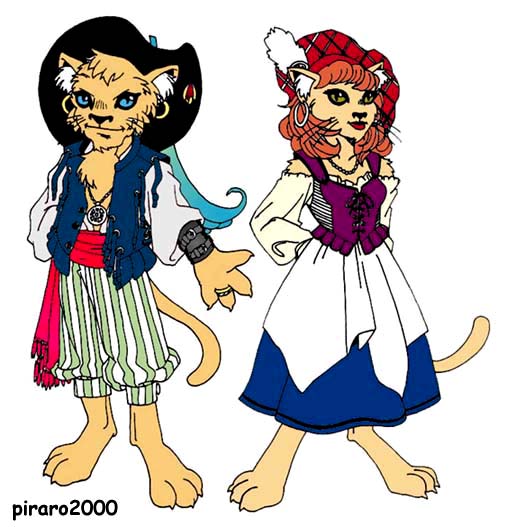


Manx are quite independent and confident in their own abilities, to the point that some see manx as being a bit cocky. Ancient tales tell of the origins of the small and weak, tail-less manx as being a cruel joke amongst the gods, until Marthayn, the Trickster, adopted them as his chosen people on a whim. He gifted them with tails, eyes that could always see danger, and a blessing of luck. He saw that their claws were small, and so to them he gave a knife, and he called it the kukri. The doomed manx have since then lived under the shadow of a universe that they were never meant to survive in, but have come to thrive and spread across the shards.
Personality: The manx mindset is a study in contradictions. On one hand, they are quick and lucky. They often outwit bad times and ill-fortune when other races suffer, and this has led them to a certain cockiness in quiet times. On the other hand, the manx are easily reminded that the universe is hostile to them, and the gods made them small and weak to die for their sport. When calamity rears its head, the manx are often already bolting for a safe haven where a moment before they strutted down the street like a peacock.
Manx tend to be a bit vain. They dislike getting their fur dirty or wet, and most manx are exceptionally proud of their tails, which they sometimes wear jewelry or other ornamentation upon. Manx seem to spend an inordinate amount of time grooming themselves, often preening in front of mirrors before they venture outside their home. Manx favor simple clothing when on the move or hunting, usually favoring a vest and a simple pair of pants if the weather is fair, and adding a poncho or cloak if in cooler climes. When in a city the majority of manx have taken to buying and wearing exceptionally fine and ornate clothes; their Ďcity clothesí are often held in higher esteem than their fur, and manx take some smug satisfaction in showing off their garments to others. Even nomadic manx from less civilized regions will have a set of work clothes and a set of fancier dress for special occasions. Dressing is a long and ornate ritual for a manx, and is often shared with another manx, or an extremely close non-manx friend.
Generally manx are a friendly people who do not easily trust others due to their raceís origins. They usually live in a state of heightened alertness around strangers or new friends, on some level fearing a sudden change in fortune or friendship. Despite this, when true danger threatens, manx usually can be found close to the largest of their companions.
Appearance: The manx stand about three feet tall, and resemble stocky bipedal cats. They are furred over their entire bodies, have cat-like fangs, tails, small retractable claws, and large cat-like eyes. Their fur comes in a variety of lengths, colors and patterns, most of them similar to those of domestic cats, or wild predatory felines. Some manx have long hair like a human, or manes, in addition to their body fur. Their faces have a slightly pronounced muzzle, and their heads are somewhat larger for their size. The build of both male and female manx tend to be on the skinny side, compared to a proportional human, but thicker than the musculature of a domestic feline.
Relationships: The manx generally get along well with most races. The ∆lven of Xauphinelle, however, think of them as vermin, and would happily carry out the genocide the gods originally planned for the race. The sirens and merrow get along well with the manx. Drakken, however, seem to cause manx fur to rise, perhaps due to their great size and ferocity. The drakken, for their part, seem not to notice this in general, and pay the manx as much attention as they do the other young races. Manx find the dwarves interesting and unsettling at the same time, due to their working with mechanisms and alchemy.
Alignment: Most manx look out for themselves and their kin, and because of this tend towards neutrality or sometimes Chaos. The minority who are truly neutral and those tending towards good are about an even split. Occasionally, a manx who has suffered greatly will turn his back on others and become evil.
On Manx Life:
The manx are stereotypically known as a nomadic, gypsy folk. Nowadays, manx are finding themselves more and more at home in the cities of other races. The manx were originally a nomadic people with no sound base of technology or metal smithing. They wandered the shards, some of them using sky ships they had bought, borrowed, or stolen, moving from place to place as food (or fortune) runs out or the mood takes them. Before the advent of elemental binding, the manx moved from shard to shard very slowly, mainly by using magic; due to this, manx who were magically gifted were important members of the clan, often taking up positions of leadership. At the very least a manx sorceror was a respected voice in clan politics, akin to a village elder. This tradition continues to this very day, despite the proliferation of elementally powered travel. Magically adept manx still command special respect, which also allows such manx to get away with behavior that would result in stern punishment if another, non-magical manx were to do the same.
Manx culture is organized by clan, whether sedentary city-dwellers or nomadic gypsies. These extended families occasionally arrange meetings of both nomadic and urban groups to meet and exchange information, goods, clothing, and to intermarry members, thereby insuring good future relations between the two clans. How many manx clans there are is unknown, perhaps even to the manx themselves, as clans freely move into and out of the boundaries of the civilized shards. This traveling gives the manx a bad name in some areas, for they are often accused of working for the Beneath, being spies for other kingdoms, or generally causing trouble. Since the manx are fairly adept at causing trouble, their bad name is not wholly undeserved.
Though most manx clans move from shard to shard, or sometimes form ghettos in cities, some of the largest shards support permanent manx groups. Lacking skyships, these clans travel in huge caravans.
Manx leadership is usually given to the family of the manx who is the greatest provider for the clan, whether it be by virtue of being a great hunter, a wielder of elemental magic, or having a talent for trade and barter with those the manx come in contact with. This leadership position is handed down to the leaderís child and from them to their child (usually the child of the leaderís choice from among their firstborn litter), until another manx contests their leadership and proves themselves a better provider for the clan. Such a decision is made by a council of the clan elders, who review the achievements of the two manx in question and bestow the title of Chief of the clan upon the one they deem most fit.
Manx make their living any way they can, akin to cross-shard gypsies in the opportunistic lifestyle. Before encountering the other races of the shards, they were mainly a hunter-gatherer type culture, but now manx supplement their hunting with trade and also find employment with non-manx, often excelling as thieves or spies. The manx regard the kukri as a weapon of divine favor, and all manx train with one. Upon coming of age, they are given a kukri as a sign of adulthood.
Manx Shards: The manx have no nations, and rarely find themselves in sole ownership of a shard. On rare occasions, such as along the borders of Velsephay, the manx are given tenancy on a small shard provided they farm it. Manx tend to assimilate themselves into the culture of other already entrenched races.
Religion: The race especially reveres Marthayn the Trickster God of Roads and Fortune. Few other gods are recognized as deserving of worship.
Language: The manx generally speak their own sing-song tongue, Manx, and Common. They are not prolific writers, and prefer their raceís oral tradition over the stories of other folk. The manx oral tradition is always sung in manx; it is considered taboo to translate these stories of Marthayn and other manx heroes.
Names: Manx personal names are generally short, and often can be used by either gender. They seem to have no meaning, but are rather sounds the sensitive ears of the manx find pleasant.
Personal Names: Fek, Nya, Karb, Phu, Seshy, Físst, Bree, Hern, Tís Tís, Oweth, Passht, Shriow.
Clan names have no set formula. Some would say that manx clan names have no rhyme or reason at all, though the manx donít believe such to be the case.
Some known clans include: Storm Tiger Clan, Quick Claws Clan, Silver Clan, Clan Sunrider, Clan Surprise, Laughing Clan, Clan Twitch Tail, Clan of the Invisible Red Path, Clan Likes Fish, and Clan Poona. There are many, many others. Some say the clan names of the manx are the legacy of the Trickster God. This may be true, as some clans change their names as the move from regions where they have gained notoriety.
Adventurers: Some manx seek to tempt fate, and dare the universe to carry out its ancient threat and destroy them. Others find adventuring a good way to make the money necessary to keep a good wardrobe. Being an adventurer is a respected profession, and manx will welcome such a fellow even if the manx in question has not actually succeeded in any adventuring.
Manx Racial Traits